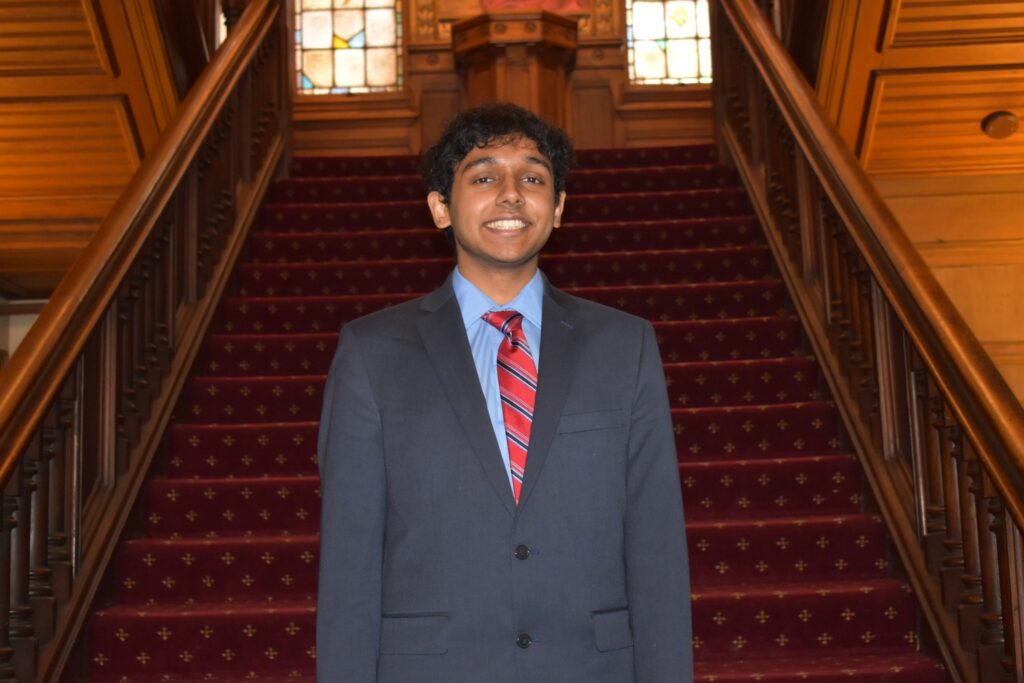By Rachel Tao, AsAmNews Intern
Many Asian Americans are born with ethnic names and end up going by a different, non-ethnic name. In fact, many second-generation children are given a non-Asian name from birth. On the other hand, other AAPI choose to go by their ethnic name and never adopt an alternative. What can these choices tell us about the power of names and identity? AsAmNews connected with two different college students to chat about their names – Aria Young of New York University and Ajay Nathan of Georgetown University.
Aria Young, a New York University sophomore from Shanghai, recently won NPR’s College Podcast Challenge with an eight-minute podcast about her personal journey with her Chinese and American names, titled “What’s in a Name.”
Young’s audio story was selected by a team of NPR judges as the grand-prize winner out of ten finalists. She will receive a $5,000 scholarship and a feature on NPR. In her podcast, she details the meaning behind her given Chinese name, 杨沁悦, or Yáng Qìn Yuè, why she changed it when deciding to move from Shanghai, China to Lancaster, Pennsylvania, and how her perception of her names has evolved since.
Young begins her podcast by explaining the meaning of her given name, Yáng Qìn Yuè. Born in Shanghai, her name was important and symbolic of her parents’ wishes for her. She says, “‘Qìn’ means ‘to seep,’ and it’s the name of a garden featured in a famous Chinese poem. The written character consists of two parts, ‘water’ on the left and ‘heart’ on the right. The second character in my given name is ‘Yuè,’ meaning ‘joy’ or ‘delight.’ So that’s what my parents wished for me, to be gentle, pure, and nurturing like water, to have a brave and kind heart, and to be joyful, happy, and carefree.”
Why Ajay Nathan kept his ethnic name
Ajay Nathan, an Indian American freshman at Georgetown University, spoke with AsAmNews about the meaning of his given name as well. ‘Ajay’ translates to “unconquerable” or “victorious” and is an epithet of the god Vishnu, who serves as a protector of the universe in Hindu mythology.
Nathan detailed his youth in Georgia and his experience of “ostracization for a name that was different but real.”
“Growing up, it was difficult being one of the only kids with a name that was hard to pronounce – whether it was a substitute teacher exclaiming, ‘I’m just going to skip this one for now’ when reading the attendance list or my friends making jokes out of my name,” he said.
When Young chose to immigrate to the U.S., she knew she would change her name to an American one, precisely to avoid situations like the ones Nathan detailed. “It’s how it always has been; you have your Chinese name and your English name because you can’t expect foreigners to pronounce your name… It’s a very deeply-rooted mindset most Chinese people have.”
When her visa agency made her decide on a definitive English name, she chose ‘Aria.’ “I wanted something that’s a bit unique, not too basic. I wanted something a little different but not weird. ‘Aria’ fit the bill. It’s also a musical term; it’s a song in opera. It symbolizes my new life in America, which will be melodic. And my given name’s second character means happiness, but it can also mean when music is pleasing to the ear. So I thought it had that loose connection with my name.”
Young calls her younger self, eager to come to the U.S., a little naive. In her podcast, she talks about how she initially adapted to American life by attempting to fit in. Young analyzed her train of thought: “This society is better [than China’s], but it didn’t accept me, so I had to change myself to fit into this society. It was kind of that mindset where I had to assimilate and Americanize myself.” She acknowledged, “This is a very colonized mindset that I had.” Part of her successful adaptation included rejecting Chinese traditions, including her Chinese name.
Young became more confident in her Chinese heritage partially because her environment changed; she moved to New York City, which was a much more inclusive and diverse place to be. “In New York, the difference just went away, and I didn’t stand out anymore… I saw a lot more people like me, and that made me more comfortable.”

Impact of anti-Asian hate
The onslaught of anti-Asian hate in the wake of the COVID pandemic also inspired her to more wholeheartedly claim her Asian identity. Additionally, when she left her small high school, she experienced life-altering personal growth. “Now that I’m a young adult, I can see my place in society a lot better, and I can feel more comfortable in myself – and not just in a cultural or ethnic sense, but in every aspect,” she reflected. “As a person, I feel better about myself.”
Although Nathan kept his name from the start, he also had a lot of growing to do in terms of accepting and loving his name and the identity that came with it. While he may have felt victimized by it when he was younger, that slowly changed.
He reflected, “As I have grown older, I have begun to find power in my name and what it means to me.”
Young had difficulty articulating her relationship with her names now, calling it “really complicated.”
Her English name signifies positive change in her life. She elaborated, “It’s a name I chose for myself, and it symbolizes this life in America I was able to build for myself, not with my parents. I came here alone, and I made it this far. This name represents my self-made life, my new life, not my old self back in China, where I wasn’t happy.”
“Here, I was given this opportunity to become my own person, and ‘Aria’ represents that part of me, that part of my identity.”
She concluded, “I don’t reject ‘Aria.’ I don’t hate that I have a White name. Lots of people who are meaningful to me now, who are important in my life, they know me as ‘Aria.’ It’s part of who I am now.”
Young continues to grapple with how to honor her Chinese identity and heritage while shaping her American life. She said that ultimately, “I want to have balance between both of my names. A lot of factors go into my name, and right now, I’m sticking with my old name while I also honor my given name.”
Some Asian Americans have found deep empowerment in sticking with their ethnic names. It is clear that Nathan will not ever go by anything other than ‘Ajay.’
“My name means a lot to me in terms of feeling connected to my culture and identity,” said Nathan. For him, his name is a significant part of his identity and heritage, and while changing one’s name like Young did is certainly understandable, it could never be an option for him.
Young has made the difficult decision to continue going by her non-native name, despite how much she admires her heritage. Nathan has made the equally difficult decision to honor his heritage and stick with his name, despite how it can sometimes affect the way he is treated.
As he put it, “When I think about the power my name gives to my identity, I feel like I can accomplish anything.”
Listen to Young’s podcast here.
AsAmNews has Asian America in its heart. We’re an all-volunteer effort of dedicated staff and interns. Check out our new Instagram account. Go to our Twitter feed and Facebook page for more content. Please consider interning, joining our staff, submitting a story or making a financial contribution.


